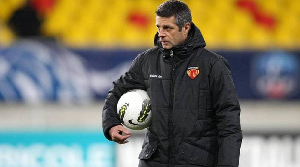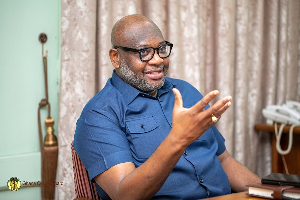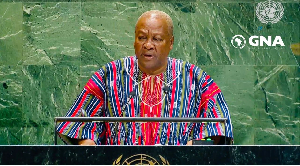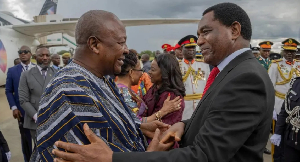By Kofi Akosah-Sarpong
The news from the United Nations and Ghana’s Statistical Service about
Sierra Leone and Ghana is good. At least from statistics point of view.
Since 1990 Sierra Leone has been at the bottom of the United Nations Human
Development Index. The Index measures human well-being globally. With good
governance, Sierra Leone is bouncing back not only from its brutal civil
war that lasted over ten years but the well-being of Sierra Leoneans.
The 2010 United Nations Human Development Index Report reveals that Sierra
Leone has remarkably moved up the development ranking, from 167th to 158th
position. On the other hand, in Accra, the latest figures, after
re-evaluation, released by Ghana’s Statistical Service say Ghana’s economy
stands at GH¢44 billion, that’s 60 per cent more than earlier estimated.
Per this new figure, Ghana is deemed to have attained a “middle income
status.” That makes Ghana’s Per Capita Income the largest in West Africa.
While the Sierra Leonean progress was greeted with many cheers, Ghana’s
was lukewarm. The centre-right columnist Ebo Quansah, in a piece entitled
The Paradox of a Middle Income Nation carried in the Accra-based The
Ghanaian Chronicle, skeptically argued that, “What is it that makes the
Government Statistician waver in her presentation? After all, we have just
worked out a miracle beyond the reach of any nation on earth. Barely 10
years ago, were we a Heavily Indebted Poor Country. We have a head of
state who said his predecessor did nothing. He himself is a Professor
Do-Little, according to his main challenger in the 2008 elections. We have
transformed the economy beyond any imaginable thing by doing nothing. Is
that not a miracle worthy of a grand feast?”
Such skepticisms aside, Sierra Leone’s rise in progress has come about
through hard planning and good governance, considering its recent bloody
affairs. Sierra Leone’s President Ernest Koroma is among a new generation
of Africa good leaders who have been praised globally. You’ve got to be
good to turn things around if you have passed through horrendous civil
war. There is no two ways about this.
Analyzing Sierra Leone’s progress in a write-up entitled Joy, as Sierra
Leone shoots up the UN Human Development Index, the editor and academic,
Leeroy Wilfred Kabs-Kanu, in the USA-based Cocorioko News, said “The
dramatic socio-economic and political turnaround brought about in Sierra
Leone by President Ernest Koroma ‘s Agenda For Change has started reaping
rich dividends…saw Sierra Leone impressively moving up the ladder from 167
to 158 in another undeniable indication that the All People’s Congress (
APC ) Government has succeeded in improving the quality of life of Sierra
Leone, even though many challenges remain for the nation, which is still
recovering from one of the bloodiest and most destructive wars in human
history.”
Whether Ebo Quansah is a centre-right journalist with sympathies for the
main opposition National Patriotic Party of Ghana or Leeroy Wilfred
Kabs-Kanu is a darling of the ruling All People’s Congress of Sierra Leone
that has appointed him the Minister Plenipotentiary to the Sierra Leone
Mission to the United Nations, at issue is whether the good statistics
equal good life. The Quansah and Kabs-Kanu interpretations, with some
political twist, nevertheless, do not affect the statistics from the UN
and Ghana’s Statistical Service.
Most Ghanaians or Sierra Leoneans will tell you they aren’t living
comfortable life, that their material conditions aren’t so good, that they
aren’t seeing gains from the statistics on the ground, that life
expectancy is still not encouraging, that some children still attend
classes under trees, that unlike Brazil over the years millions of
Ghanaians and Sierra Leoneans have not been lifted out of poverty, and
that even in good number of places it is hard to find water to drink or
toilets to use.
All these hard lives are true and make nonsense of the good statistical
news but so also is the fact that the statistics (despite some of its
abstractness) actually come from real life in the real world. How easy it
is to eat three-times-a-day? Has homelessness being reduced? How many
toilets have been built to deal with the poor sanitation? Those who agree
with the good statistics will tell you that part of the successes have
come about because of Ghana’s “Better Ghana Agenda” or Sierra Leone’s
“Agenda for Change” that have created the conducive atmosphere for the
rule of law, good governance, human rights, freedoms and democracy to
drive progress.
This is unlike years ago when brutal military juntas and autocratic
one-party systems destructively infested Ghana, Sierra Leone and other
parts of West Africa and suppressed the tenets of democracy and freedoms.
No matter the Ebo Quansah and Wilfred Kabs-Kanu take on the good
statistics, what have garnered some upliftment of Sierra Leoneans and
Ghanaians are the emergent democratic tenets, especially freedoms. The
Indian economist and Nobel Prize laureate Amartya Sen will not dispute the
implications of freedoms to the two countries’ progress.
In Sen's Development as Freedom (1999) the inherent implications of
freedoms as cruise for progress is very much examined. The relevance is
seen more in Sierra Leone and Ghana, where long-running unfreedoms had
stifled progress but are now flowering because of the growth of freedoms.
In both countries, Sen’s scrutiny of the connection between freedom and
progress, the ways in which freedom is both a basic constituent of
advancement and an enabling key to other aspects of progress, are made
clear.
The Sierra Leone and Ghana success stories show that there is no
propaganda in this. With long history of tyranny, military juntas and
autocratic one-party systems, freedoms as fertilizer to grow progress in
Sierra Leone and Ghana have been weak, and in some cases extremely bad, as
we saw in Sierra Leone, where the absence of freedoms helped collapsed the
states.
No doubt, Wilfred Kabs-Kanu’s joyful take on Sierra Leone’s vivid escape
from the bottom of the progress Index is a reflection of not only Ghana
but the entire West Africa, where democratic tenets are flourishing backed
by new generation of leaders and mass media genuinely committed to
democratic rule. We cannot be pessimistic about this.
Writes Kabs-Kanu: “The result of all this transformation is that Sierra
Leone is no longer among the 10 least developed nations in the world. At
158, there is still much room for development but a UN official told me
today that President Koroma has provided the enabling environment for
Sierra Leone to move even further up the human development index.”
Kofi Akosah-Sarpong,BA,MJ,MA
338 Jamesville Avenue, Apt#1C, Syracuse, NY 13210, USA
Tel : (315) 450-4680 or (313) 796-6238;
E-mail: kakos064@uottawa.ca
Opinions of Wednesday, 24 November 2010
Columnist: Akosah-Sarpong, Kofi














